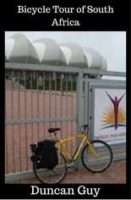
Photograph: The ruins of South End’s old church, a mosque and PE harbour
Ernest described the old South Enders as proud, working class people of different race groups, religions and cultures who were able to live side by side and happily in one community of between 15,000 and 20,000 people: something that apartheid rulers couldn’t stomach.
Up the stairs, a sports exhibit boasted the successes of people like the bodybuilder Ron Eland, who, restricted by race laws, left for Britain where he qualified for that country’s 1948 Olympics team.
A music exhibition told of a popular Latin-American band called the Cubans and gave accounts of the use of saxophone music to which people did the once-popular “langarm” dances.
Then there were accounts of fishing.
A photo showed a Mr Amanie Abrahams showing off his prize catch of a fish called a katonkel, also known as a king mackerel.
“Katonkel were caught regularly off the breakwater and many fishermen in old South End earned a living by catching fish off the breakwater,” read a caption.
Describing the destruction of South End, Ernest lamented: “Soccer clubs, neighbourhoods, churches, the very fabric of society scattered.”
“With fewer resources people had to re-establish. People found themselves away from economic activity. There are still legacies of this in Port Elizabeth’s coloured townships, such as the high crime rate.” However, he also believes the ability of church congregations to raise funds to build new places of worship where South Enders found themselves “says a lot for the human spirit”.
Ernest and his museum colleague’s main tasks had involved information gathering, starting with the elderly folk, collecting oral history, documents, memorabilia and photographs.
“We are trying to record exactly what people felt at the time; the emotions that went with the forced removals, so that we have it on record.”
Sometimes they’re met with resistance.
“There is still a deep sense of hurt when it comes to forced removals and the way apartheid laws affected people. There are still people who will never support Springbok teams because they feel the present government has not done enough. They’re still trapped in the townships they were moved to. They’re still trapped in poverty.
“For them the changes in South Africa came too late.”
However, Ernest had no illusions of South End ever returning to what it was but he and his team aimed to send a message across the seven seas: that forced removals should never happen again, not in any country in the world.
“We need to remind people of the futility of social engineering.”
QUESTION: How important do you think it is to know about the past?


